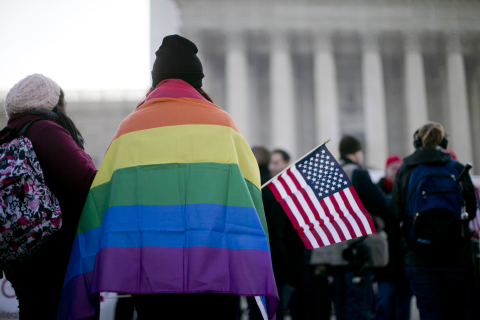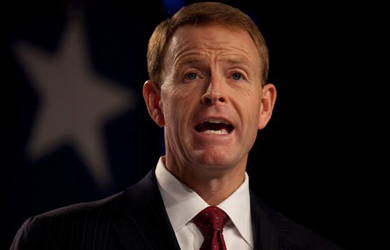The other day, the American Family Association’s OneNewsNow ran an article claiming that a recent poll conducted by the Military Officers Association of America showed that members of the military overwhelming oppose efforts to repeal Don’t Ask, Don’t Tell:
One of the leading activists opposed to homosexuals serving in the U.S. military says she’s pleased that a recent poll of military officers shows overwhelming support for the 1993 ban enacted during the Clinton administration.
The poll was conducted by the Military Officers Association of America, or MOAA, with the results recently published in The Washington Times. By a two-to-one margin, the MOAA survey respondents favored the current policy or an even stronger law regarding the ban of homosexuals from military service. The survey also found that 68 percent of respondents believe that repeal of the law would have a negative effect on troop morale and military readiness.
Elaine Donnelly, president of the Center for Military Readiness, says this survey has effectively torpedoed the high-powered PR campaign for homosexuals in the military.
“What they’re saying here is, ‘Mr. President and Congress, we support this law. We think it would be disruptive to repeal it. And we ask that you support the law or certainly not go along with any efforts to undermine or repeal that law,'” she notes.
The Washington Times article in question noted that while the “organization consists of about 370,000 members representing every branch of the armed forces,” the web-based survey it conducted only “received 1,664 responses.” But that was apparently enough for the paper to declare that the “majority of American service members oppose integrating gays openly in the military” and for OneNewsNow and Donnelly to declare that the “survey has effectively torpedoed the high-powered PR campaign for homosexuals in the military.”
Not so fast, says Col Marv Harris, MOAA’s Director of Public Relations, who sent a message to David Hart explaining that the survey was “statistically invalid [and] not a reliable indicator of how a population feels about an issue”:
To seek some member input, MOAA developed a five-question survey for MOAA members and put it on the MOAA web site and highlighted it in the legislative update. Web surveys aren’t a reliable tool, but it was our only option to let members respond because we did not have time to develop a mail-out survey to a statistically valid random sample of members before the November meeting.
As it turned out, only about 500 people took the survey over 11 days. Because of the low response and indications that some non-members were passing the survey around to their friends in an effort to skew the results, we concluded that the results could not be considered a valid representation of member views and removed the link to the survey from our web site. Only recently did we learn that the data was still accessible if someone had written down the original link to it. We’ve since removed it.
The Board, in determining its position, considered inputs from members of the Board (particularly those currently serving), the Currently Serving Advisory Committee, and the MOAA staff. They agreed that the survey results were too skimpy and unreliable to be of any validity.
…
We are declining to provide a copy of the survey or discuss the results. The survey was statistically invalid for the reasons stated above, and therefore not a reliable indicator of how a population feels about an issue.
To its credit, MOAA is refusing to stand by the “results” of this survery, but I highly doubt that will stop Donnelly from continuing to cite it as “proof” in her campaign to protect the military from the scourge of homosexuality.








